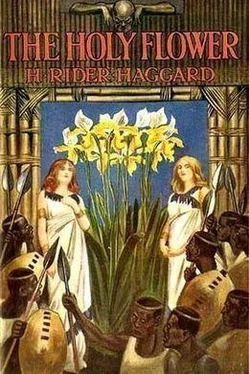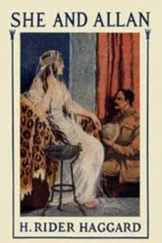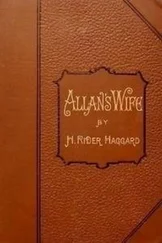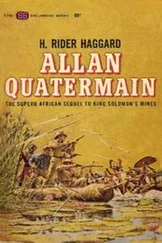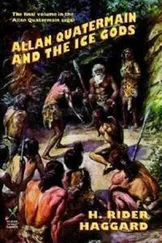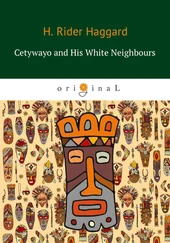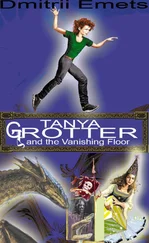Генри Хаггард - Allan and the Holy Flower
Здесь есть возможность читать онлайн «Генри Хаггард - Allan and the Holy Flower» — ознакомительный отрывок электронной книги совершенно бесплатно, а после прочтения отрывка купить полную версию. В некоторых случаях можно слушать аудио, скачать через торрент в формате fb2 и присутствует краткое содержание. Год выпуска: 2014, Издательство: epubBooks Classics, Жанр: Путешествия и география, на английском языке. Описание произведения, (предисловие) а так же отзывы посетителей доступны на портале библиотеки ЛибКат.
- Название:Allan and the Holy Flower
- Автор:
- Издательство:epubBooks Classics
- Жанр:
- Год:2014
- ISBN:нет данных
- Рейтинг книги:5 / 5. Голосов: 1
-
Избранное:Добавить в избранное
- Отзывы:
-
Ваша оценка:
- 100
- 1
- 2
- 3
- 4
- 5
Allan and the Holy Flower: краткое содержание, описание и аннотация
Предлагаем к чтению аннотацию, описание, краткое содержание или предисловие (зависит от того, что написал сам автор книги «Allan and the Holy Flower»). Если вы не нашли необходимую информацию о книге — напишите в комментариях, мы постараемся отыскать её.
Allan and the Holy Flower — читать онлайн ознакомительный отрывок
Ниже представлен текст книги, разбитый по страницам. Система сохранения места последней прочитанной страницы, позволяет с удобством читать онлайн бесплатно книгу «Allan and the Holy Flower», без необходимости каждый раз заново искать на чём Вы остановились. Поставьте закладку, и сможете в любой момент перейти на страницу, на которой закончили чтение.
Интервал:
Закладка:
"Baas," said Hans, "it is Sammy in the corn–pit!"
Now I remembered that such a pit existed in front of the huts which, although empty at the time, was, as is common among the Bantu natives, used to preserve corn that would not immediately be needed. Once I myself went through a very tragic experience in one of these pits, as any who may read the history of my first wife, that I have called Marie , can see for themselves.
Soon we cleared the place and had lifted the stone, with ventilating holes in it—well was it for Sammy that those ventilating holes existed; also that the stone did not fit tight. Beneath was a bottle–shaped and cemented structure about ten feet deep by, say, eight wide. Instantly through the mouth of this structure appeared the head of Sammy with his mouth wide open like that of a fish gasping for air. We pulled him out, a process that caused him to howl, for the heat had made his skin very tender, and gave him water which one of the Mazitu fetched from a spring. Then I asked him indignantly what he was doing in that hole, while we wasted our tears, thinking that he was dead.
"Oh! Mr. Quatermain," he said, "I am a victim of too faithful service. To abandon all these valuable possessions of yours to a rapacious enemy was more than I could bear. So I put every one of them in the pit, and then, as I thought I heard someone coming, got in myself and pulled down the stone. But, Mr. Quatermain, soon afterwards the enemy added arson to murder and pillage, and the whole place began to blaze. I could hear the fire roaring above and a little later the ashes covered the exit so that I could no longer lift the stone, which indeed grew too hot to touch. Here, then, I sat all night in the most suffocating heat, very much afraid, Mr. Quatermain, lest the two kegs of gunpowder that were with me should explode, till at last, just as I had abandoned hope and prepared to die like a tortoise baked alive by a bushman, I heard your welcome voice. And Mr. Quatermain, if there is any soothing ointment to spare, I shall be much obliged, for I am scorched all over."
"Ah! Sammy, Sammy," I said, "you see what comes of cowardice? On the hill with us you would not have been scorched, and it is only by the merest chance of owing to Hans's quick hearing that you were not left to perish miserably in that hole."
"That is so, Mr. Quatermain. I plead guilty to the hot impeachment. But on the hill I might have been shot, which is worse than being scorched. Also you gave me charge of your goods and I determined to preserve them even at the risk of personal comfort. Lastly, the angel who watches me brought you here in time before I was quite cooked through. So all's well that ends well, Mr. Quatermain, though it is true that for my part I have had enough of bloody war, and if I live to regain civilized regions I propose henceforth to follow the art of food–dressing in the safe kitchen of an hotel; that is, if I cannot obtain a berth as an instructor in the English tongue!"
"Yes," I answered, "all's well that ends well, Sammy my boy, and at any rate you have saved the stores, for which we should be thankful to you. So go along with Mr. Stephen and get doctored while we haul them out of that grain–pit."
Three days later we bid farewell to old Bausi, who almost wept at parting with us, and the Mazitu, who were already engaged in the re–building of their town. Mavovo and the other Zulus who died in the Battle of the Gate, we buried on the ridge opposite to it, raising a mound of earth over them that thereby they might be remembered in generations to come, and laying around them the Mazitu who had fallen in the fight. As we passed that mound on our homeward journey, the Zulus who remained alive, including two wounded men who were carried in litters, stopped and saluted solemnly, praising the dead with loud songs. We white people too saluted, but in silence, by raising our hats.
By the way, I should add that in this matter also Mavovo's "Snake" did not lie. He had said that six of his company would be killed upon our expedition, and six were killed, neither more nor less.
After much consulting we determined to take the overland route back to Natal, first because it was always possible that the slave–trading fraternity, hearing of their terrible losses, might try to attack us again on the coast, and secondly for the reason that even if they did not, months or perhaps years might pass before we found a ship at Kilwa, then a port of ill repute, to carry us to any civilized place. Moreover, Brother John, who had travelled it, knew the inland road well and had established friendly relations with the tribes through whose country we must pass, till we reached the brothers of Zululand, where I was always welcome. So as the Mazitu furnished us with an escort and plenty of bearers for the first part of the road and, thanks to Sammy's stewardship in the corn–pit, we had ample trade goods left to hire others later on, we made up our minds to risk the longer journey.
As it turned out this was a wise conclusion, since although it took four weary months, in the end we accomplished it without any accident whatsoever, if I except a slight attack of fever from which both Miss Hope and I suffered for a while. Also we got some good shooting on the road. My only regret was that this change of plan obliged us to abandon the tusks of ivory we had captured from the slavers and buried where we alone could find them.
Still, it was a dull time for me, who, for obvious reasons, of which I have already spoken, was literally a fifth wheel to the coach. Hans was an excellent fellow, and, as the reader knows, quite a genius in his own way, but night after night in Hans's society began to pall on me at last, while even his conversation about my "reverend father," who seemed positively to haunt him, acquired a certain sameness. Of course, we had other subjects in common, especially those connected with Retief's massacre, whereof we were the only two survivors, but of these I seldom cared to speak. They were and still remain too painful.
Therefore, for my part I was thankful when at last, in Zululand, we fell in with some traders whom I knew, who hired us one of their wagons. In this vehicle, abandoning the worn–out donkeys and the white ox, which we presented to a chief of my acquaintance, Brother John and the ladies proceeded to Durban, Stephen attending them on a horse that we had bought, while I, with Hans, attached myself to the traders.
At Durban a surprise awaited us since, as we trekked into the town, which at that time was still a small place, whom should we meet but Sir Alexander Somers, who, hearing that wagons were coming from Zululand, had ridden out in the hope of obtaining news of us. It seemed that the choleric old gentleman's anxiety concerning his son had so weighed on his mind that at length he made up his mind to proceed to Africa to hunt for him. So there he was. The meeting between the two was affectionate but peculiar.
"Hullo, dad!" said Stephen. "Whoever would have thought of seeing you here?"
"Hullo, Stephen," said his father. "Whoever would have expected to find you alive and looking well—yes, very well? It is more than you deserve, you young ass, and I hope you won't do it again."
Having delivered himself thus, the old boy seized Stephen by the hair and solemnly kissed him on the brow.
"No, dad," answered his son, "I don't mean to do it again, but thanks to Allan there we've come through all right. And, by the way, let me introduce you to the lady I am going to marry, also to her father and mother."
Well, all the rest may be imagined. They were married a fortnight later in Durban and a very pleasant affair it was, since Sir Alexander, who by the way, treated me most handsomely from a business point of view, literally entertained the whole town on that festive occasion. Immediately afterwards Stephen, accompanied by Mr. and Mrs. Eversley and his father, took his wife home "to be educated," though what that process consisted of I never heard. Hans and I saw them off at the Point and our parting was rather sad, although Hans went back the richer by the £500 which Stephen had promised him. He bought a farm with the money, and on the strength of his exploits, established himself as a kind of little chief. Of whom more later—as they say in the pedigree books.
Читать дальшеИнтервал:
Закладка:
Похожие книги на «Allan and the Holy Flower»
Представляем Вашему вниманию похожие книги на «Allan and the Holy Flower» списком для выбора. Мы отобрали схожую по названию и смыслу литературу в надежде предоставить читателям больше вариантов отыскать новые, интересные, ещё непрочитанные произведения.
Обсуждение, отзывы о книге «Allan and the Holy Flower» и просто собственные мнения читателей. Оставьте ваши комментарии, напишите, что Вы думаете о произведении, его смысле или главных героях. Укажите что конкретно понравилось, а что нет, и почему Вы так считаете.
